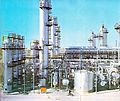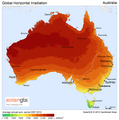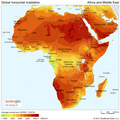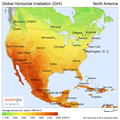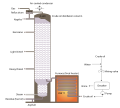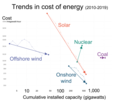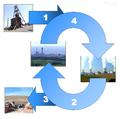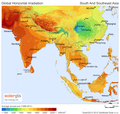Portal:Energy
| Main page | New articles & Tasks |
 The Energy Portal Welcome to Wikipedia's Energy portal, your gateway to energy. This portal is aimed at giving you access to all energy related topics in all of its forms.
|
Page contents: Selected article • Selected image • Selected biography • Did you know? • General images • Quotations • Related portals • Wikiprojects • Major topics • Categories • Help • Associated Wikimedia |
Introduction
Energy (from Ancient Greek ἐνέργεια (enérgeia) 'activity') is the quantitative property that is transferred to a body or to a physical system, recognizable in the performance of work and in the form of heat and light. Energy is a conserved quantity—the law of conservation of energy states that energy can be converted in form, but not created or destroyed. The unit of measurement for energy in the International System of Units (SI) is the joule (J).
Forms of energy include the kinetic energy of a moving object, the potential energy stored by an object (for instance due to its position in a field), the elastic energy stored in a solid object, chemical energy associated with chemical reactions, the radiant energy carried by electromagnetic radiation, the internal energy contained within a thermodynamic system, and rest energy associated with an object's rest mass. These are not mutually exclusive.
All living organisms constantly take in and release energy. The Earth's climate and ecosystems processes are driven primarily by radiant energy from the sun. The energy industry provides the energy required for human civilization to function, which it obtains from energy resources such as fossil fuels, nuclear fuel, and renewable energy. (Full article...)
Selected article
Deepwater Horizon was an ultra-deepwater, dynamically positioned, semi-submersible offshore drilling rig owned by Transocean and operated by the BP company. On April 20, 2010, while drilling in the Gulf of Mexico at the Macondo Prospect, a blowout caused an explosion on the rig that killed 11 crewmen and ignited a fireball visible from 40 miles (64 km) away. The fire was inextinguishable and, two days later, on April 22, the Horizon collapsed, leaving the well gushing at the seabed and becoming the largest marine oil spill in history.
Built in 2001 in South Korea by Hyundai Heavy Industries, the rig was commissioned by R&B Falcon (a later asset of Transocean), registered in Majuro, and leased to BP from 2001 until September 2013. In September 2009, the rig drilled the deepest oil well in history at a vertical depth of 35,050 ft (10,683 m) and measured depth of 35,055 ft (10,685 m) in the Tiber Oil Field at Keathley Canyon block 102, approximately 250 miles (400 km) southeast of Houston, in 4,132 feet (1,259 m) of water. (Full article...)
Selected image
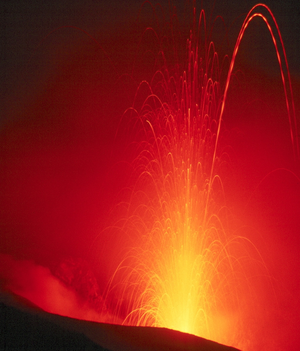
Photo credit: From an image by Wolfgang Beyer
Strombolian volcanic eruptions can eject incandescent cinder, lapilli and lava bombs to altitudes of tens to hundreds of meters.
Did you know?
- Samuel Andrews (1836–1904) was an English-born chemist and inventor whose request for investment capital to build an oil refinery in 1862 led to a partnership with John D. Rockefeller and the formation of the Standard Oil companies?
- Golar Spirit (pictured) is the world's first floating storage and regasification vessel converted from a LNG carrier?
- The Rockies Express Pipeline, currently under construction, will be one of the largest natural gas pipelines ever built in North America?
- Syncrude Canada Ltd. is the world's largest producer of synthetic crude oil from oil sands?
- During World War II, Australia produced almost 500,000 barrels of shale oil by operating the Nevada–Texas–Utah type of oil-shale retorts?
- The Sangtuda 1 Hydroelectric Power Plant is expected to provide up to 12% of the total energy output of Tajikistan?
Selected biography
In 1831, Faraday began his great series of experiments in which he discovered electromagnetic induction. He established that a changing magnetic field produces an electric field, a relation mathematically modelled by Faraday's law. Faraday later used the principle to construct the electric dynamo, the ancestor of modern power generators. He went on to investigate the fundamental nature of electricity, concluding in 1839 that, contrary to opinions at the time, only a single "electricity" exists, and the changing values of quantity and intensity (voltage and charge) would produce different groups of phenomena.
Some historians refer to Faraday as the best experimentalist in the history of science. Despite this his mathematical ability did not extend so far as trigonometry or any but the simplest algebra. He nevertheless possessed the ability to present his ideas in clear and simple language. During his lifetime, Faraday rejected a knighthood and twice refused to become President of the Royal Society.
In the news
- 6 January 2025 – Syrian civil war
- The International Committee of the Red Cross announces plans to expand its operations in Syria beyond an initial US$100 million program, citing urgent needs in the health, water, and power sectors. (Reuters)
- 28 December 2024 – Moldova-Russia relations
- Russian company Gazprom announces the supply of gas to Moldova will cease on January 1, 2025, alleging fails to fulfill its payment obligations. The Moldovan Prime Minister, Dorin Recean, accuses the Russian Government of deliberately weaponising energy flows to destabilise the country. (Euronews).
- 28 December 2024 – Lukoil oil transit dispute, Ukrainian energy crisis, Slovakia–Ukraine relations
- Slovakia threatens reciprocal measures against Ukraine's plans to suspend the transit of Russian oil to Slovakia on January 1, including suspending electricity supplies. In response, Ukrainian President Volodymyr Zelenskyy accuses Slovakia of opening a "second energy front" against Kyiv under Moscow's orders. (Al Jazeera)
- 25 December 2024 – Russian invasion of Ukraine
- Russian strikes against Ukrainian infrastructure, Ukrainian energy crisis
- A series of Russian ballistic missile and drone strikes target critical energy infrastructure in cities across in Ukraine, killing at least two people, injuring 20 others, and causing widespread emergency blackouts. Ukrainian President Volodymyr Zelenskyy condemns Russian President Vladimir Putin for the "inhumane" attacks on Ukrainian infrastructure. (The Kyiv Independent) (The Guardian) (RTÉ)
General images
Quotations
- "Our children will enjoy in their homes electrical energy too cheap to meter." – Lewis Lichtenstein Strauss, 1954
- "There is every possibility that you will soon be able to tax it." – Michael Faraday, talking to William Gladstone on the future purpose of electricity.
- "Higher energy prices act like a tax. They reduce the disposable income people have available for other things after they've paid their energy bills." – John W. Snow, 2005
- "Our dependence on foreign energy is like a foreign tax on the American people." – George W. Bush, 2005
Related portals
WikiProjects
WikiProjects connected with energy:
Other WikiProjects that may be of interest:
Major topics
Major categories
National energy supply, use & conservation
National electricity sector
Politics, economics, environment
- Climate change
- Energy conservation
- Energy economics
- Energy crises
- Energy development
- Energy policy
- Peak oil
Energy sources
- Fuels
- Biofuels
- Fossil fuels
- Fusion power
- Nuclear technology
- Renewable energy
- Energy conversion
- Electric power
- Energy storage
Energy-related design
Scientific usage
Help

Puzzled by energy?
Can't answer your question?
Don't understand the answer?
- Ask at the reference desk
- Read the Wikipedia help pages
For further ideas, to leave a comment, or to learn how you can help improve and update this portal, see the talk page.
Associated Wikimedia
The following Wikimedia Foundation sister projects provide more on this subject:
-
Commons
Free media repository -
Wikibooks
Free textbooks and manuals -
Wikidata
Free knowledge base -
Wikinews
Free-content news -
Wikiquote
Collection of quotations -
Wikisource
Free-content library -
Wikiversity
Free learning tools -
Wiktionary
Dictionary and thesaurus












